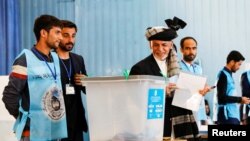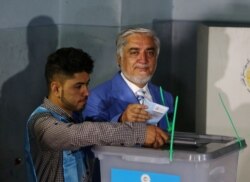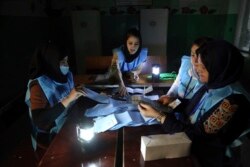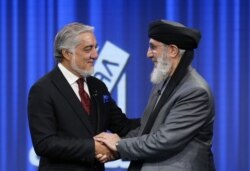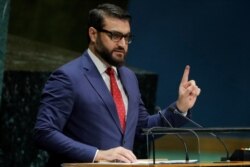Margaret Besheer at the United Nations contributed to this report.
KABUL - Afghan President Ashraf Ghani and his main rival Chief Executive Abdullah Abdullah are both claiming victory in Afghanistan's presidential election, ahead of the release of any official results.
Ghani's running mate Amrullah Saleh told VOA's Pashto service that he and Ghani got 60% of the vote in Saturday's election.
Abdullah told reporters Monday that he has "the most votes."
Election officials however said official results have yet to be announced.
The process of counting votes in Afghanistan is long. Ballot boxes have to arrive from far off places with little or no communication lines. The preliminary results are not expected for a few weeks.
The election was held Saturday amid repeated threats by the Taliban and fear of post-election chaos.
Unofficial estimates indicate the voter turnout was historically low. VOA teams found empty polling stations and empty ballot boxes in the capital Kabul and many other parts of the country.
Extreme threats from the Taliban, voter dissatisfaction with candidates, and confusion over whether the twice-delayed elections will be held this time, kept campaigns from gaining steam.
Now that they were held, given Afghanistan’s track record, many fear a dispute over results that could devolve into a full-blown crisis.
Some candidates, like former warlord turned politician Gulbuddin Hekmatyar, seem to already be preparing for such a scenario.
“The elections will result in increased violence. No one will accept the results other than those who were involved in widespread fraud. Naturally, it will result in a crisis,” he said.
“The law is very clear. If there is fraud, candidates and their followers can go to the Election Complaints Commission and register their complaints. The commission will decide upon them and we are committed to abide by its decision,” said Habibur Rehman, Secretary of the Election Commission.
At the United Nations Monday, Afghan National Security Adviser Hamdullah Mohib delivered the country’s statement at the General Assembly’s annual debate.
He said Afghans turned out despite Taliban threats of violence.
“We all voted not just for a president, but we also voted for democracy,” Mohib said. “We voted for our constitution. We voted for freedom and sovereignty. We voted for prosperity and connectivity. We voted for peace. And we voted for the Islamic Republic of Afghanistan.”
Mohib, who is his 36 years old, said the new generation of leaders coming up in Afghanistan grew up in war and want to see peace.
“No matter the outcome of the presidential elections, one thing is clear — peace is and will remain the government’s priority, now further strengthened by the mandate bestowed upon the government by the Afghan people,” he said.
“Join us in peace, or we will continue to fight,” he told the Taliban, warning that “this is a fight we can win.”
The last presidential election was marred by allegations of fraud and the country became so divided that then-Secretary of State John Kerry had to step in and broker a power-sharing deal between the two leading candidates, Ghani and Abdullah.
Despite the introduction of more robust systems this time to avoid fraud, including taking finger prints and pictures of voters, allegations of fraud have already emerged from certain quarters.
If more voices join ranks, this could wreak havoc to an already fragile system.
Both election and security authorities insist that they are ready to deal with any scenario. And everyone is hoping for a smooth transition. But Afghanistan has a long history of post-election chaos.




